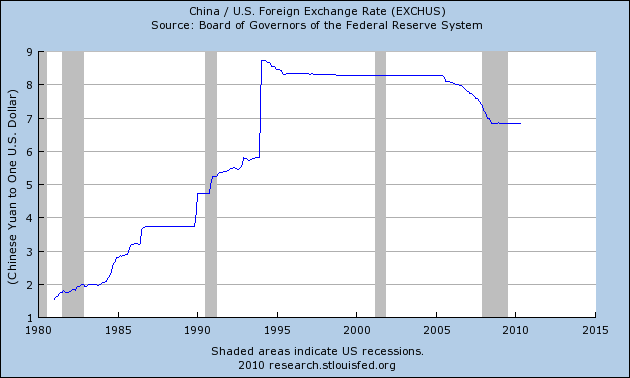What’s the Chinese Word for Baloney?
March 17, 2010
(This item originally appeared in the Huffington Post on March 17, 2010.)
http://www.huffingtonpost.com/nathan-lewis/whats-the-chinese-word-fo_b_502534.html
There has been an explosion of arguments that China is somehow embarking on a policy of competitive currency devaluation. Even certain otherwise-respectable newspaper columnists have been getting into the game.
It’s complete baloney.
Look at the graph. This is a record of the exchange rate between the Chinese renminbi and the U.S. dollar since 1981.

What do you see?
It’s been mostly a straight line since 1994. China has had roughly the same monetary policy as California.
On this graph, a rise in the renminbi’s value produces a decline in the red line, because it takes fewer renminbi to buy a dollar. The only thing that has happened in the last sixteen years is a rise in the renminbi against the dollar during the 2005-2008 period.
This is the exact opposite of a “competitive devaluation,” don’t you think?
You could argue that China had some competitive devaluations during the 1980s. We can see that the value of the renminbi fell considerably against the dollar during that period.
Actually, a competitive devaluation was never the goal during the 1980s either. There was a lot of economic turmoil in China during that time, which led to a declining currency. The Chinese government was actually working on ways to prevent the currency from declining, and around 1995 they finally figured it out.
You can see they temporarily stabilized the renminbi’s value in the late 1980s for several years, around 3.80/dollar, but it didn’t stick.
Today’s generation of economists have been taught they can solve virtually any economic problem with monetary manipulation. This doesn’t really work because jiggering the unit of account doesn’t really solve any problems, but only creates new ones.
The Chinese figured this out during the 1980s, which is why they went to a dollar peg.
If you start with this ideology – that monetary manipulation is the path to prosperity – then it follows immediately that any sort of stable-currency policy is a problem. Whether the Chinese dollar peg (which has worked rather well), or the common euro currency, they insist that each government have a currency that floats.
You have to understand: these people only have two tricks. One is to manipulate the currency. The other is government spending.
Once people figure out that their two tricks don’t work, and only create more problems, the game is over for them. Nobody takes them seriously anymore.
People are already getting suspicious that government spending doesn’t live up to its fancy marketing. We’ve had enormous budget deficits around the world, but not much in the way of results unless you are a direct recipient of taxpayer funds.
For the time being, the money manipulators seem to be ascendant. I think we are actually quite close to their high point. From here on out, I predict that people will be less and less satisfied with the results they get from various forms of an easy money policy.
“You can’t devalue yourself to prosperity,” it used to be said, and guess what: it’s true!
When governments finally understand this, they try to make their monetary affairs as stable as possible.
For China this meant a dollar peg, because the dollar — though it is a floating fiat currency — is nevertheless the world’s reserve currency. The advantages of a stable and predictable exchange rate outweighed the disadvantages of the floating dollar.
If the U.S. government wanted to make its currency as stable and predictable as possible, what would they peg it to? Obviously, you can’t peg the dollar to the dollar.
Historically, governments aiming for the best possible currency stability have always pegged their currencies to gold.
What’s really going on here is that the U.S. government wants a competitive devaluation against the renminbi! Of course, they can’t put it in those terms. It is a little too blatant.
When I observe this spectacle of the U.S. government pursuing policies that are clearly self-destructive — cheered along by certain economists and many Congresspeople — I have to conclude that the empire is in decline.
How’s your Mandarin?

